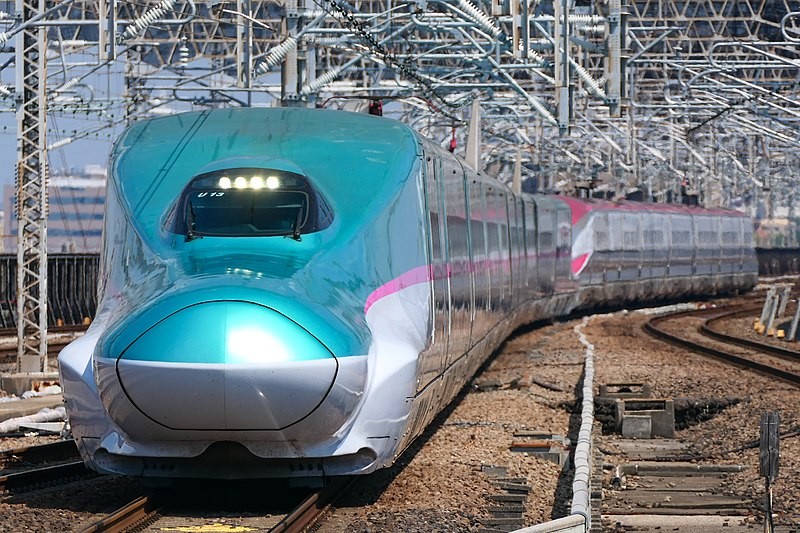
Bullet train tunnel boring machines stuck in China, sparking concerns over key project timeline
New Delhi: Three massive tunnel boring machines (TBMs), crucial for building the underground stretch of India’s Mumbai–Ahmedabad bullet train, are currently stuck at a Chinese port, raising concerns over potential delays in the high-profile ₹1.08 lakh crore infrastructure project, according to an Economic Times report.
The TBMs, manufactured in Guangzhou by German company Herrenknecht, are meant for the 21-km underground section from Bandra-Kurla Complex (BKC) to Shilphata.
Two of the machines were scheduled to reach India by October 2024, while the third was expected earlier this year.
However, clearance from Chinese authorities has not come through yet, and no official reason has been provided for the delay.
A senior railway official confirmed that the Ministry of Railways has escalated the matter to the Ministry of External Affairs, seeking diplomatic intervention.
The issue involves not just the TBMs but also vital components needed for ongoing civil works, with particular concern over potential delays to the undersea tunnel segment under Thane creek.
The National High-Speed Rail Corporation Ltd (NHSRCL), which is implementing the project, had planned to deploy TBM-1 and TBM-2 for the stretch between Sawli (Ghansoli) and BKC, while TBM-3 was designated for tunnelling between Vikhroli and Sawli.
The segment includes India’s first undersea rail tunnel—a 7-km stretch under Thane creek—one of the most complex and technically demanding portions of the corridor.
While NHSRCL officials have so far refrained from commenting, sources close to the project said the overall timeline remains unchanged for now.
Since the 2020 Galwan Valley clash between Indian and Chinese troops, India has heightened scrutiny of Chinese imports and investments.
That year, Chinese firms were dropped from Mumbai’s monorail upgrade project, and three large MoUs under Maharashtra’s Magnetic Maharashtra 2.0 initiative, worth over ₹5,000 crore, were put on hold.
Before the border standoff, several Chinese-made TBMs were used for the Mumbai Metro and coastal road projects. But post-2020, infrastructure projects such as the Thane–Borivli tunnel have sourced TBMs from Herrenknecht’s Indian facility in Alinjivakkam, Tamil Nadu.
However, the TBMs currently held up in China are not standard machines. One of them is the largest ever made for use in India, featuring a cutter head diameter of 13.56 metres—far larger than the 6.7-metre diameter typical of metro TBMs and even surpassing the 12.19-metre TBM used for the Mumbai Coastal Road.
Equipped with a mixshield configuration, these TBMs are designed to handle mixed geological conditions—rock, soil, and varying groundwater levels—making them critical for the intricate tunnelling job.
Afcons Infrastructure Ltd, the contractor awarded the ₹6,397 crore Package C-2 in June 2023, is currently preparing ground works while waiting for the TBMs.
This contract covers a 20.377-km stretch from BKC to Shilphata and is slated to be completed in 5.17 years.
To facilitate the TBMs, three vertical shafts are under construction: 36 metres deep at BKC, 56 metres at Vikhroli, and 39 metres at Sawli.
Additionally, a 42-metre inclined shaft at Ghansoli and a tunnel portal at Shilphata are being developed for NATM (New Austrian Tunnelling Method) works.
The tunnel itself will run between 25 to 65 metres below ground, with a maximum depth of 114 metres under Parsik Hill.
It will navigate challenging terrains, including dense urban zones, wetlands, and a major waterbody—making every metre of excavation critical.
Despite the uncertainty, neither Afcons nor NHSRCL have issued revised timelines. Both firms declined to comment.
However, officials familiar with developments said that NHSRCL, Afcons, Herrenknecht, and relevant ministries are in close coordination to resolve the situation.
“The equipment waiting at the Chinese port includes not just the TBMs but also key components essential for other ongoing works,” one official pointed out.
While construction on other aspects of the project continues, the hold-up at the Chinese port is becoming an increasingly urgent concern. With every passing day, the pressure to get the TBMs moving builds—and so does the risk of the project timeline slipping deeper underground.
Support Our Journalism
We cannot do without you.. your contribution supports unbiased journalism
IBNS is not driven by any ism- not wokeism, not racism, not skewed secularism, not hyper right-wing or left liberal ideals, nor by any hardline religious beliefs or hyper nationalism. We want to serve you good old objective news, as they are. We do not judge or preach. We let people decide for themselves. We only try to present factual and well-sourced news.







